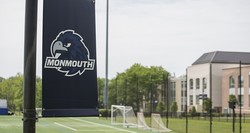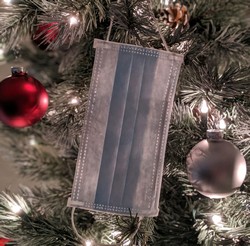President Patrick F. Leahy Ed.D., and Communication faculty member Matt Harmon discussed the spring semester on their weekly “Monmouth Mondays” podcast on Tuesday, Jan. 26. The episode detailed health protocols and the return of sports,
The University will retain all testing capabilities for the community’s students, faculty, and staff, Leahy said.
“Our testing protocols are going to be pretty rigid,” Leahy explained. “For the athletes, it’s going to be even more rigid because NCAA and Conference protocols demand it. We’re happy to abide by those added protocols.”
Leahy intends the spring semester to unfold similarly to the previous semester, opening the dining halls with limited capacity and offering takeout for students. About 1100 students are living on campus this semester, 50 percent below normal residence hall capacity, according to Leahy.
“It’s a lot lower than normal, but it’s about what we had in the fall,” Leahy said. “Those students that want to be back on campus, even if much of their academic programming is still online, are welcome to be here. We love having them here, it provides some energy to the campus.”
The University initially required all residential students to present a negative COVID-19 test before returning to campus. Students and parents pushed to rescind the request after trouble acquiring a COVID-19 test in their home communities.
“When they raised that concern, we decided we’ll do the testing here,” Leahy said. “We’ll make sure we take care of our students. We changed the policy just slightly to suggest either bring us a negative test or you must be tested within the first couple days of returning.”
Requiring residential students to be tested within 72 hours of their return will allow the University to start from square-one, Leahy explained. “If there are any positive cases, we can move on those immediately. We’ll isolate those positive tests and do the contract tracing to make sure all direct contacts are also quarantining to keep the case load at an absolute minimum.”
In lieu of a week long spring break, the semester incorporates “break days” in March and April. Removing spring break allowed for an extra week before the semester’s start, helping the quarantine protocols required for returning out of state students.
“That extra week was really helpful in that regard,” Leahy said. “We’ll have a couple Fridays off, but we are going to be able to make up that time by collapsing spring break. We needed the week now more than in the middle of the semester.”
The University will have its spring athletics in full swing, compliant with state, national and conference-specific COVID-19 safety measures.
Leahy detailed the challenge of managing two sports teams during the winter break, a small-scale operation in comparison to over 20 programs moving in tandem during the spring.
“There’s one reason that we are trying to move Heaven and Earth to make these athletic programs available this spring,” Leahy said. “That is because our student athletes want the opportunity to try and compete. That’s it. There’s this false impression about money… it is simply about knowing how important sport activities are to [our student athletes]. It’s about how good it is for their mental and their physical health, and how important it is to them.”
Harmon, broadcaster for multiple University sports, asked Leahy how realistic it may be to facilitate up to 20 sports during the spring athletic season.
“We’re blessed with the facility that could allow it,” Leahy explained. “We’re blessed with a first rate athletics department that is interested in trying to make this happen. We can afford the testing protocols that are required. I would like to think compared to a lot of other institutions, we’re in a relatively better position to pull this off.”
It would be difficult to guess which sports could be interrupted and which could not, Leahy said. The spring athletic calendar consists mostly of outdoor sports, a perk that will slow potential COVID-19 spread.
“Monmouth may be equipped for [spring sports] because of its fields, stadiums, good facilities, and good staff,” Harmon explained. “Not to say that other Universities that Monmouth will play during the course of the spring [aren’t also prepared], but it’s not just Monmouth. We may be ready to go but a school that might be on Monmouth’s schedule might not be ready to go. As we’ve seen during the basketball season, you keep your fingers crossed, essentially, up until an hour before game time and you hope you can move forward.”
The University’s men’s basketball team suffered four different COVID-19 related pauses, the most recent due to a positive test from a Tier One program member. Tier One is considered players, coaches and support staff.
“If we ever had evidence there was a positive case on either side, it would necessitate an immediate shutdown,” Leahy said. “You’re right, it’s not just what we do here on this campus, but it’s what all of our competitors do.”
Leahy is confident in the other Universities that make up local athletic conferences to handle COVID-19 cases seriously.
“I think the MAAC (Metro Atlantic Athletic Conference) in particular, where I am very involved, are all very good colleagues and were all committed first and foremost to student health and safety,” Leahy said. “I think all of us are going to take the protocols equally seriously and that’ll give us some comfort.”
PHOTO COURTESY of Anthony DePrimo



